- Home
- Kate Quinn
A Song of War: a novel of Troy Page 22
A Song of War: a novel of Troy Read online
Page 22
The Achaeans were being driven back. From a distance of perhaps three hundred paces, I could see no individual. I could only see the lines ebb and flow and flinch. The Achaean line bent and cracked like a whip; men spilled out of the back of their phalanx like black blood from a bad wound.
Down at my feet in the ditch, a charioteer was weeping. As I watched, he killed one of his horses who had a black arrow in his throat and another in his side.
The charioteer’s master was also dead, sprawled over the chariot car like a heap of discarded armor.
I looked back at the battle, trying to understand what I was seeing, wishing for a guide. I had never seen a battle before, but I understood the theory, if you will. In the center of both lines stood the great mass of spearmen with their heavy shields, who stood to push their spears and shields forward or die trying; and on the flanks milled the great warriors in their chariots. Some fought from their chariot cars, using bows or javelins or even long spears against other chariots or against the flanks of the spearmen; others sprang from their cars and ran in to fight on foot, trusting superior skill and armor to protect them, or with their chariot runners, men who wore no armor and ran along with the chariots; the best athletes make the best bodyguards.
But in that hour, it was chaos, and the Achaeans were doing most of the dying. As I watched, finally able to distinguish the parts of the Achaean line because it had recoiled another hundred paces, even then, I saw the very center of the Achaean line shake like a forest in the wind and then shatter, and spearmen were running—no longer one or two cowards, but now a whole taxeis, throwing down their tall shields.
And then a chariot burst through the hole in their line.
It was almost beautiful and almost obscene, too; the chariot came through the line like an animal questing for food, like a tongue emerging from a mouth, wheels bouncing over the fallen, horses biting. Spearmen flinched away to the left and right, widening the breach, and then the thing was free and the beasts were running. I had time to admire the charioteer; he handled the bodies and the terror of his horses magnificently, and suddenly I knew him from the way he handled his team—he had armor that gleamed, and the only armored charioteer I’d ever seen was Hector’s.
And as Skara said, he was like a lion. But not a lion who rages against another lion. No, that evening, as the last rays of blood-red light flared on the face of his shield, Hector was the lion who kills the gazelles, raging among them and slaughtering, not for food but because he is blood-mad. So Hector raged among the Achaeans, and the wheels of his chariot left two shining tracks of blood in the well-trampled grass.
And behind him came another chariot, and another, and then the whole Achaean line shattered, or rather, it gave way like a sail ripping to pieces on a stormy night at sea. Out on the flanks, the heroes in their chariots had time and space to make an escape, but in the center of the plain, the fever-weakened Achaeans were hunted to death by a pride of lions.
Almost at my feet, Hector caught a fleeing chariot; Stichius, the Boeotian captain. Hector’s chariot came up behind the Boeotian’s, and Hector leaned out, caught his adversary by the neck armor, and threw him from his chariot. His charioteer reined in, and Hector leaped out the back of his moving car into a sea of fleeing Achaean spearmen who ran past him, and he took Stichius’ head with his sword and gave a roar that seemed to me to move the walls and palisades, and I knew that Zeus had filled him with power and given him glory.
“What in the name of Hades is happening out there, young man?” someone asked at my elbow.
So rapt was I in the battle that I had not noticed the approach of a man; and no mere man, but one of the Achaean kings. He was probably the oldest man in the camp; he had seventy years, but his eyes were clear, and he was still a big, heavy warrior, and he towered over me, even without his armor. He had a full white beard.
“My king,” I said, making my voice as deep as I dared. “The Achaeans are broken, and Hector rages like a lion.”
“Son of a bitch,” Nestor of Pylos said. He had two spearmen by him; neither had any armor, but they were big men. I wanted to be away; it was not dark enough to cover my smooth face.
He was too busy taking in the sheer immensity of the disaster to worry about my gender. “On me,” he snapped and trotted off along the wall with the energy of a much younger man.
The order had been given directly to me. I had no choice. I followed him.
He ran for the west gate, roaring orders. The only men inside the wall were the wounded, the shirkers, and the very sick. And women, of course. But no one notices women.
“Darkness will save us,” the old king said. “I have seen many battles, many victories, and many defeats. No one pursues a beaten enemy in the dark. We need half an hour.”
He ordered his two spearmen to collect any men they could find. “Slaves and cowards!” he said. “Anyone, as long as his hand can grip a spear and his shoulder bear the weight of a shield.”
We ran all the way to the west gate, and he was breathing hard. He put a hand on my shoulder. “I am not... ” he breathed, “as young... as I... ” He coughed. “Fuck,” he spat.
His chariot was waiting by the gate, his charioteer standing with the reins around his waist, out of the car to save the horses. As the old king ran up, the charioteer began to put the king’s armor on him, plate by plate.
“Open the gate on my word,” Nestor called. I looked over my shoulder and realized that he must mean me, and I went to the great double-doored gate. It had a bar—almost a whole tree but with handles set every few feet. I could see that it was built not to lift, but to slide into a stone-lined hole in the earthwork wall.
His spearmen gathered a mongrel band, even by Achaean standards. But they had spears, and shields, most of them; a few were actually slaves. I thought the old king mad.
But despite his boasting, he did indeed know a few things about war.
“Open the gate,” he called when he was fully armored, his voice firm. His charioteer had armed him, and he wore bronze in the old style—a massive suit that covered every inch of him, and he had a heavy spear, as long as a boat pole, with a trident point.
I had worried for nothing. My strength was easily up to moving the gate bar, so perfectly was it set and balanced, and I pushed it back and then put my shoulder to the gate, and it moved.
Nestor looked at me as he passed. “You have greaves and a sword, young man,” he said. “You look god-born. Come and fight.”
I had no choice, nor did I really want to hang back. Call me a fool; I loathed the Achaeans and admired the Trojans, but the battle was for all of us god-born a game, a wonderful game, and I wanted to play. I wanted to play well, to show that I, a mere woman, had more than what was between my legs.
I trotted along behind his car like a chariot runner; those are the spearmen that the very rich use, superb athletes who pace the chariot and help their master fight in the swirling spear-storm rather than standing in the phalanx. I was too small, but then, he’d summoned all the cowards and shirkers, hadn’t he?
We flowed out onto the plain. The sun was gone, but there was still light to see, and the Achaeans were trying to form at the lip of their ditch, although many were running for their gates or even up and over the wall.
But footmen knew Nestor. His voice galvanized them, and men who were fleeing in panic would suddenly stop, look at the white-haired king, and then run, not away, but to the swelling ranks of his desperate counterattack. This is the power of great reputation.
And he had the touch. Go on, ask why I was going to war with the rapists and murderers against mighty Hector and freckled, lovely haired Andromache, and all I can say is that I could not refuse Nestor. And my curiosity was greater than my fear or my notions of right and wrong. And I was a fool.
We did not go far out on the plain, perhaps two or three hundred paces, but our mob of mixed routers and the sick and lame of the camp was on the flank of the Trojan attack, and the Trojan spearmen and c
harioteers became aware of us and began to look over their shoulders. Gloom was falling; it is difficult to see in twilight, and gods walk more easily then, too. I could hear men in the Trojan ranks shouting, “Poseidon has come!” and pointing at old Nestor, and indeed, in his glorious old armor and carrying his massive sea-spear, he looked the part, and his horses were magnificent, too.
Nestor's driver turned his chariot. I was still pacing him with the two spearmen he’d had by his side from the first.
I was watching the ground for a shield.
Just to our left were the remnants of the Achaean chariotry; almost a hundred chariots that had withdrawn to the west when the rout began, and now a chariot trotted out of the mob and came to us, horses blown, forth at their nostrils, eyes rolling and flashing, and the charioteer had an arrow in his right bicep. He was a brave man; he was driving with his hips and trying to keep the arm steady at the same time, and red blood poured down his side.
Nestor knew the warrior in the chariot. “Eurypilos!” he called.
“By the Zeus of kings,” the other man said. He had a bad wound on his thigh, like an evil mouth, and black blood flowed over his leg despite a rope twisted to staunch the flow. “Nestor, you must save us.”
The charioteer suddenly gave a cry and sank to his knees. His head hit the rail of his chariot, and he gave a little scream.
I caught him falling. He’d lost a great deal of blood; he was so pale that his skin was like parchment.
The aristocrat shook his head. “He's done, poor boy.”
Nestor was watching the battle. “I don't want to attack them,” he said, indicating the Trojans. “The men behind me aren’t worth a shit. I just want to look dangerous.”
“Agamemnon and Menelaus are both wounded,” Eurypilos said. I could hear the fear in his voice, almost like panic. “They say Odysseus is lost.”
Nestor’s face hardened.
The man in my arms began to gulp for air. He made an odd noise in his throat. He was brave, but the darkness was falling for him, I could tell. His lips moved.
And then he was gone.
Nestor looked at me. “Can you drive, boy?” he asked.
“Yes, my king,” I said.
He said something to his own charioteer and then looked back at me in the dying light while two of his spearmen dragged the dead charioteer out of the car and laid him on the ground with surprising gentleness.
“My brother’s third son,” Eurypilos said to me, or to the air.
Nestor ignored him. He looked back at the red sky behind us and then to the Trojans, now milling a spear’s cast away but not advancing.
“Take this man back to the camp,” he told me. “And do not let him talk to spearmen with all his tales of Odysseus being dead, or we’ll have a panic. Who are you, boy?”
“Brises,” I said, giving the male version of my name. “My father is king of Menes,” I added. Menes is a village on the west coast of Lesvos so small it doesn’t have a sheep fold.
I stepped up into the car. Eurypilos was also bleeding badly; it was clear even to a neophyte in the art of war like me that the Trojan archery was hurting the Achaeans worse than their spearmen.
The car rocked, and I had a moment of disorientation, but I pressed into the curve of the front and gathered the reins, talking to the two horses, both of them middling size and nicely matched bays. Ordinarily, I’d have walked around them, settled their bits, patted them.
There was no time.
Even dying, the brave charioteer had kept the reins separated, and I ran them through my fingers and then passed them around my waist and tied them in a loose knot in front. Nestor grunted in approval.
“Get out of here, boy. I may have to fight. Look alive, you louts!” he shouted at the spearmen behind him.
Other chariots were rolling up from the pack of beaten Achaeans, and men were dismounting to stiffen the Argive shield wall.
I didn’t wait to be told twice. I clucked, and my blood-nervous horses stepped out, rocking the car.
Eurypilos put a hand on my shoulder. “Careful, damn it!” he shot at me. “You have done this before?”
So much of which to be afraid; his hand on my shoulder, perilously close to discovery; my linen cap dangerously close to falling off my head and exposing all my hair; the chariot team, blood-mad and frightened, considering a bolt; my own skills, honed on the Field of Ares, and perhaps never that brilliant...
“Yes,” I said.
He shook his head and settled unwillingly, a joint at a time, onto the stretched sinew of the chariot car’s floor. His legs weren’t holding him.
The west gate was still open. In fact, it looked to me as if I left it open and no one behind me had thought to close it; what a prize that would have been for the Trojans! I rolled us through and saw no one and reined in. Eurypilos was beyond complaint by then, although not yet dead. I wanted to close the gates, but the task was beyond me. I was afraid even to loose the reins around my waist; the horses would be gone.
I had no idea where to take the fallen man. I didn’t know the camp aside from the Myrmidon’s stretch and the area around Agamemnon’s ramshackle palace.
My passenger groaned, and I snapped the reins at my horses and let them run a little of their terror out. We moved fast along the inner perimeter road along the walls, and I saw that the camp of the Myrmidons was not so far as I had thought, or perhaps being mounted made it seem closer.
And, as if it was fated, or the will of my Lady, the first man I saw was Patrocles. He was wearing the sort of old wool chiton a warrior wears under armor, and he had his beautiful tinned-bronze greaves on.
I reined in.
“Who's there?” Patrocles asked. He leaned into the car. Darkness was falling fast.
“Eurypilos of... ” I began and realized I did not know where he hailed from. “And I’m... Briseis.”
He looked up from the prostrate passenger to me. “So you are, my dear,” he said, as if women dressed as boys were an everyday occurrence in the Myrmidon camp. “Eurypilos?”
The man groaned.
“Ares! Take him to our tent. Now—directly. Here.” Patrocles pulled himself up into the car. I snapped the reins, and my horses, tired now and with nothing much to fear, were hard to raise even to a trot. But they obeyed and didn’t fight me, which was good. A man had died in my arms, and I was not immune to the passing of his soul; I was shaken and as glad to see Patrocles as I had been on the beach.
“Should I ask how you come to be driving a war car?” Patrocles asked, then shook his head. “No,” he said. “First, tell me of the fighting.”
“I can’t pretend to understand what I saw,” I said, “except that the Achaean center was broken by Hector, and this man said that Odysseus was dead and Agamemnon and Menelaus wounded.”
“Tartarus,” he spat. “Blood of the gods! This is disaster.” He turned from me. It was almost full dark.
“Nestor is trying to hold the Trojans by subterfuge,” I said.
“Nestor is the best of the Achaeans,” Patrocles said. “He, not Agamemnon, should be commanding us.” He leaned out of the car as we passed a campfire. “Phoenix!” he roared.
“Here!” called the older captain.
“Arm! Full phalanx! Right now!” Patrocles called.
As we drove deeper into the Myrmidon camp, the “ants” poured from their tents, from their seats at fires, and ran to their arms. That’s what the other Achaeans called them, ants, because they seemed to march and serve without their own will. Unlike the Achaeans, where every man left his gear in heaps on the ground, the Myrmidons had their spears in stands, their great tower shields in neat stacks, their armor in baskets.
I hauled the reins in front of Achilles’ pavilion. He sat before it in his ivory chair, his eyes glowing in the darkness. I felt something, even through the daemon of combat, but I couldn’t say, even now, what it was.
“You have called the Myrmidons to arms,” Achilles said by way of greeting Patrocle
s.
“Odysseus is dead, and Agamemnon is wounded,” Patrocles said. He was already kneeling by Eurypilos. “Linen, boiled water, honey. Now!” he snapped at Skara when she appeared. She turned and ran. Other slaves came, a dozen Trojan boys, and they lifted the fallen Achaean from the car. The horses didn’t like them, and I had to hold them, and finally, as more and more Myrmidons gathered, I jumped over the front rein and the chariot pole as I had seen Dion do, and I got the horses’ heads and held them by their mouth-bits.
Full dark had fallen; true night. Men came with torches, and Patrocles began to treat Eurypilos’ wounds.
Achilles didn't even rise from his chair. “Why are my spearmen arming for war?” he asked, his voice mild.
Patrocles spoke with the authority of the older man. “Didn't you hear me? Odysseus is lost, the one man among the Achaeans for whom you had respect. Agamemnon is wounded. The center was broken by Hector.”
Achilles smiled and gave a slight shrug. “So?” he asked. “When Agamemnon’s heralds come on bended knee, then perhaps I will allow the Myrmidons to arm.”
Patrocles had a length of fine linen in his hand, and Skara was cutting it into two narrow strips with a knife. “And what if the Trojans storm the camp while we sulk in our tents?” he asked. “We may be right, and nicely indignant, but we will most assuredly be dead.”
Achilles surprised me then. He laughed his girlish laugh, which sounded so strange when you first heard it. “You may have a point there,” he admitted. “Very well; have Phoenix see to our sections of the ramparts. And a heavy quarter guard in case there are Trojans in the camp.”
“And you will allow the walls to be stormed?” Patrocles asked.
Both of godlike Achilles’ eyebrows went up. “I'll applaud,” he said.
“The Achaeans are dying,” Patrocles said.
“Good,” Achilles said.
The next hours were full of rumor and panic; the Achaeans saved their fortress-camp only because of Nestor, I think. But the Achaean army was beaten and sullen; they clustered by their fires and kicked their slaves like the thugs they were. And the Trojans didn’t retreat for the night, as they had other nights, or so I was told; instead, they made a hasty camp just a spear-cast beyond the ditch and shot arrows at random into our camp.

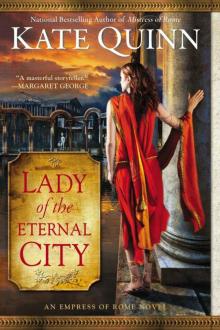 Lady of the Eternal City
Lady of the Eternal City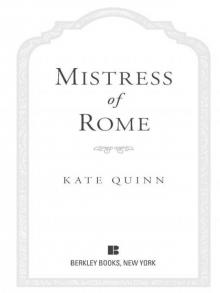 Mistress of Rome
Mistress of Rome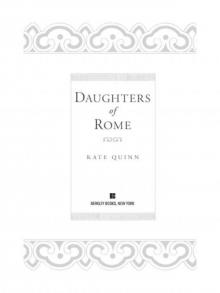 Daughters of Rome
Daughters of Rome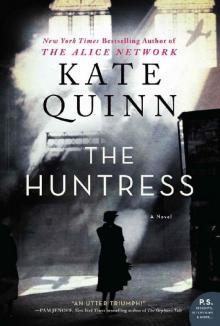 The Huntress
The Huntress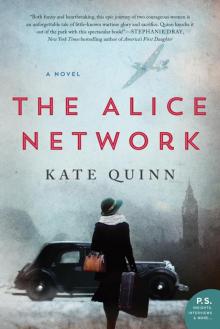 The Alice Network
The Alice Network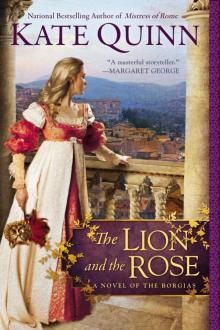 The Lion and the Rose
The Lion and the Rose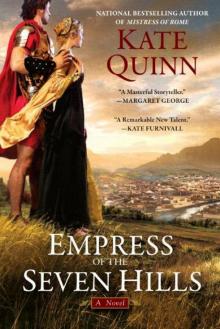 Empress of the Seven Hills
Empress of the Seven Hills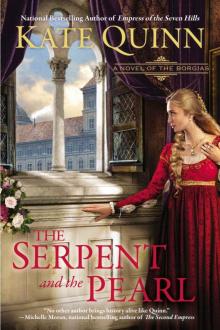 The Serpent and the Pearl
The Serpent and the Pearl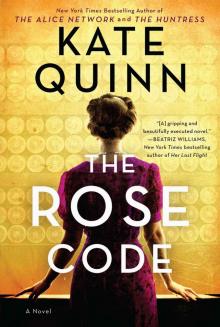 The Rose Code
The Rose Code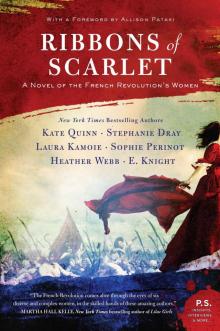 Ribbons of Scarlet
Ribbons of Scarlet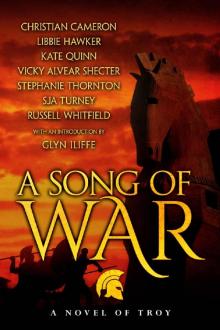 A Song of War: a novel of Troy
A Song of War: a novel of Troy